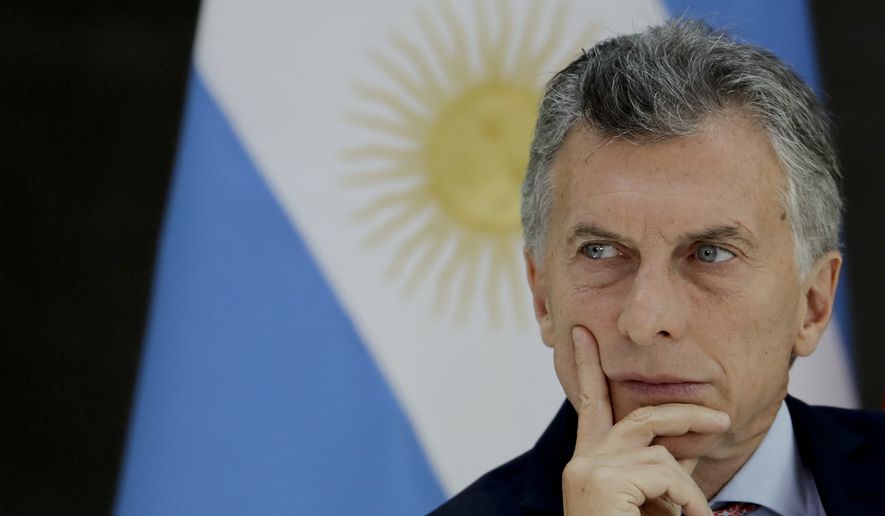BUENOS AIRES | A Wednesday vote on legalizing abortions in Argentina, highly anticipated because of the ripple effects it could cause across Latin America, has turned into a nail-biter, with the long-favored anti-abortion camp’s lead narrowing in the final hours.
Following a marathon debate amid dueling protest marches, lawmakers in the lower house of Congress are expected to vote in the wee hours of the morning on the bill that would allow all abortions until the 14th week of pregnancy.
A Tuesday vote count showed 117 lawmakers favoring the measure, with 119 opposed and 19 undecided. If subsequently approved by the Senate, President Mauricio Macri, despite being an abortion opponent, is expected to sign the bill into law.
Wednesday’s vote follows a months-long national debate that pitted pro-life groups backed by the influential Catholic Church against a women’s rights coalition seeking to make Argentina the first major Latin American country to allow all abortions, which would be provided free of charge in public hospitals. In nationally televised committee hearings, lawmakers heard hours of emotionally charged testimony from dozens of witnesses after Mr. Macri had opened sessions on March 1 with a plea for a “mature” debate he said the country owed itself after decades of kicking the can down the road.
Actress and singer Muriel Santa Ana told the panel about a secret abortion she had had in the early 1990s.
“I went to the office of a doctor known at the time as head of OB-GYN at a very important public hospital; he gave me instructions, and I gave him the money,” the 47-year-old artist recalled. “A week later, I went to the apartment [he] used for the surgery. … The operating room was the kitchen.”
Lawmakers, Ms. Santa Ana urged, needed to acknowledge reality and protect women’s lives.
“The question here is secret abortion or legal abortion,” she said. “Abortion exists; it existed and will continue to exist, whatever it is you legislate.”
Other witnesses, though, made equally impassioned pleas against the procedure, with 43-year-old engineer Javier Walter recounting the first time he met his biological grandmother in a tiny village in Argentina’s northern Formosa province.
“All my life I knew I was adopted: My last name is ’Walter’ — German — and you’ll notice I’m not that German,” the dark-skinned father of three joked. “[My grandmother] told me, ’I have to ask you for forgiveness … because I wanted for you not to be born.’ And the first thing I did [was] to hug her.”
In Argentina, abortions today are legal only in exceptional cases, such as if the pregnancy results from rape or if the pregnant person’s health is in danger — a conservative approach the country shares with all of its Latin American neighbors except the smaller nations of Uruguay and Guyana.
But if the abortion bill moves forward, history suggests it could well spawn similar efforts across the region. After Argentina became the region’s first country to legalize same-sex marriage in 2010, Brazil, Mexico, Colombia and Uruguay soon followed suit.
“What happens in Argentina is absolutely central to what happens in the entire region,” prominent Brazilian pro-choice activist and Yale Law School visiting fellow Debora Diniz told The Washington Times.
And ahead of public hearings on abortion scheduled before Brazil’s supreme court in August, Ms. Diniz said Argentine cities filling up with the green handkerchiefs — the symbol adopted by the pro-choice coalition — has been “stimulating.”
“We are the region with the world’s most restrictive laws and the highest rates of abortion in the whole world,” she said. “The region demonstrates that criminalization does not reduce abortion rates — just the opposite.”
Buenos Aires Archbishop Mario Poli has not been shy about lecturing Mr. Macri that “[Pope] Francis teaches us that the defense of the unborn must be clear, firm and passionate.” But Church leaders have avoided a high-profile clash like the one Francis, then still Cardinal Jorge Bergoglio, and leftist President Cristina Fernandez fought over same-sex unions.
But ahead of Wednesday’s vote, lawmakers in this traditionally Catholic country are still feeling the pressure from constituents, he said, with protest marches suggesting anti-abortion sentiment is particularly strong in Argentina’s vast interior, which in turn accounts for most of the undecided votes.
For Mr. Macri, the debate may just be political gold, distracting from unhappiness over the government’s economic austerity measures, while dividing the opposition.
“It’s an uncomfortable debate for both positions, and [he] kind of stoked it,” he noted. “The government launched this debate, in part, to produce a short-circuit between the Church and social sectors.”




Please read our comment policy before commenting.